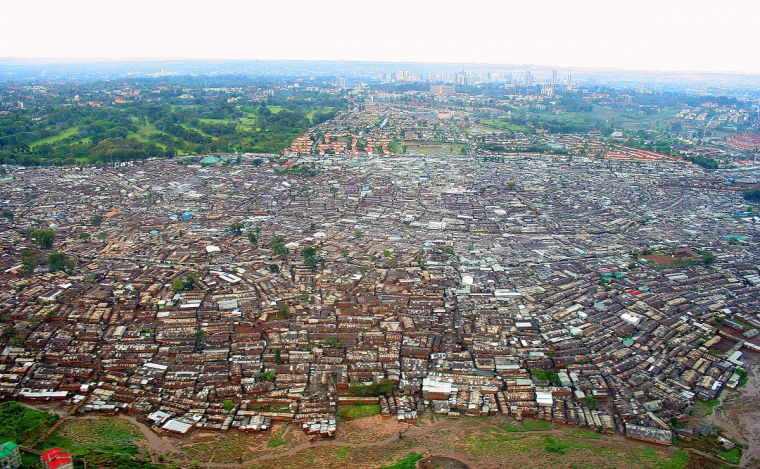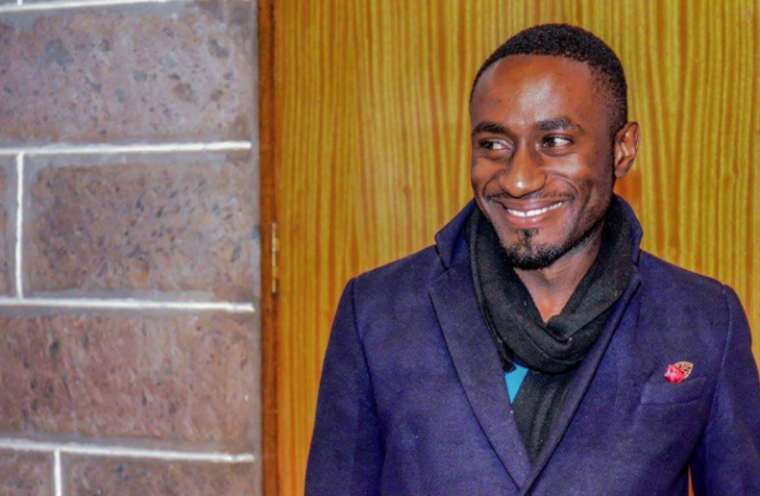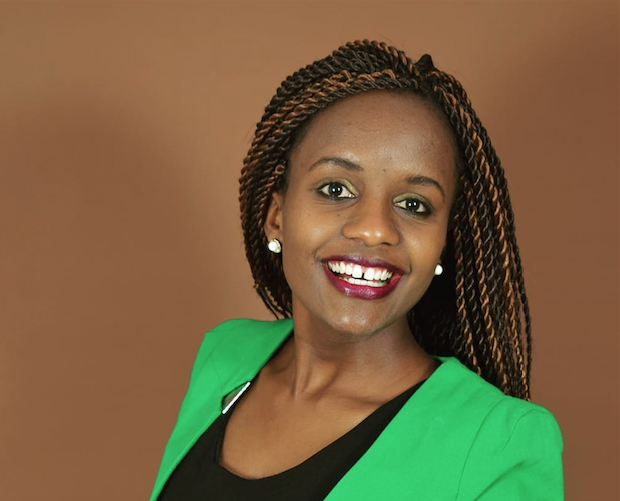How Compassion changes lives: we meet the graduates who prove charity sponsorship works
As I sat down for my first dinner in Kenya in June, I was greeted by a gentleman in a suave suit, smiling from ear to ear and holding out an open hand to shake mine.
He introduced himself as Boniface 'Bonny' Lumumba, a self-confessed style guru to the stars, a wannabe chef and – in the meantime – a business consultant.
Little was I to know that only a matter of years ago, he was a child of Compassion, living in the slums of Kenya with no money, no food and very little hope.

'What good can come out of Kibera?' he asked me, pondering on whether such a place of horrific poverty – as I had seen with my own eyes – gives any chances to it's thousands of children in need.
While I sat dumbfounded by his question, he pointed to himself and beamed with pride, explaining that he, a child of the slums, not only had a range of full-time jobs, but a degree and a range of interesting hobbies.
I was stunned by his academic prowess, his professional manner, and above all his never-ending ambition. I would never have guessed that he had come from poverty.
And he was not alone – as we settled down at the end of our meal, a well-dressed and confident young woman with long box braids tied neatly off her face took to the stage to talk.
Brenda Karimi stood microphone in hand, telling her story of childhood abuse that has now led her to becoming the inventor of a girl's protection programme without even the slightest stumble – she oozed the grace of a professional public speaker.
Before I had left for Africa, many people had asked me about young adults like these. They were curious to know if the children living in poverty they had seen on the Compassion UK website were really being helped – did they really escape the slums?
From my humble place at that table in Nairobi, their questions were being answered by the faces of success for Compassion, and with their two stories would come many more behind them.
Here, Bonny and Brenda, both graduates of the Compassion programme, tell their own stories in their own words, and act as proof that sponsorship really is the secret to changing the lives of babies born into poverty.
Bonny Lumumba, 29
I am the second eldest of four children – born to a then very young man settling down with an even younger immigrant wife. I call them my parents.

Neither of them had any form of formal education and so white-collar employment was not easy to come by, and they quickly found themselves short for money and slipping down the ladder into poverty.
My childhood was spent in Kibera, a Nubian name that translates to 'Dark forest', or as many people know it, the biggest slum to the East side of the Sahara. It is where I called home for over three-quarters of my life, a place famous for crime – and the robbery of children's dreams.
Kids like me were devoid of ambition and drive, our lives were left to fate. Some boys like me would fail, end up in gangs across the 'hood', stealing or begging, and others would end up dead.
Compassion took me in at the Kibera Church of God Student Centre when I was too young to understand their work – but at that age, I wasn't going to say no to a free plate of rice, a big field to play soccer on and other children to play with. It was all a not-so-common delicacy for children like me.
Even though the project I went to only happened once a week – I couldn't wait to be there. I'd wait all week in anticipation, and then my heart broke whenever the time to go home drew close. I never wanted to leave.
I would have stayed there all day and night if I could to escape the outside world – all I wanted was to spend time writing to my Ohio–based sponsor family Daniel and Lynn and their daughter Jordan. I felt that they loved me and understood me thousands of miles away.
The centre steadily morphed from a place to be fed to an actual tangent in my life. I got an identity. I met Christ here. I met real friends and social workers who cared.
Suddenly I could attend school full time without worrying about fees each day. I was fully clothed in a school uniform to keep me warm in winter, and I was always well fed. I was being given an education that built on my curiosities and strengthened my weaknesses.
I had access to my first computer here and a fully stocked library – absolutely unheard of in the slums. It was a world away from the struggles at home. I started to dream about achieving in the future so I could escape poverty.
A well laid foundation saw me through high school and into college for four years, and I successfully graduated with a Diploma in Aeronautical Engineering.
Fast forward to 10 years since then, and I feel I have undergone a true metamorphosis. I am now a beautiful butterfly. Compassion helped me develop from that unhappy, under-fed and ill-fated caterpillar I once was.
Now I am working as a communication strategist for the Kenyan government alongside numerous corporate agencies. I even run my own businesses on the side.
I am a foodie and love anything to do with food preparation and production, so I a became a part-time chef with my own grocery delivery company. And since I love fashion, I am also a professional stylist who specialises in dressing popular Kenyan TV hosts and public figures.
Would you have expected that of some kid from the slum? Would you have thought so much good could come from Kibera? Compassion was the stepping stone to all this success in my life.
After all this time, I still call my second Compassion sponsor Phillip 'dad' - the effect of sponsorship has gone on and on throughout my life. I don't think it will ever stop.
Compassion not only provided me with the dollar I needed to change my life, but the dream I could change myself.
Brenda Karimi, 27
Growing up in a small village in the eastern part of the country, life was not easy. I often stayed at home due to lack of school fees, and my father did not believe in educating a girl child so getting an education was a big problem.
My mum tried to raise me and provide for my basic needs, teaching me herbal medicine, cookery and domestic skills, but every day I slept hungry and walked around barefoot. I didn't have any comfort in life. It was a hopeless situation.

In the midst of the hustles and bustles of life, at the age of six I was recruited in a Compassion Development Centre. At that age, I would never have known what that place would do for me.
My life changed from the second I joined the project. The environment was friendly and the teachers were kind and loving, so different to what I had known before, with strangers often being hostile and rude.
There would be enough food and drinks for everyone, something I had never experienced – nobody would go hungry – and we prayed and played with our teachers.
Compassion was the only joy in my life when my mum got married again. She may have fallen in love, but I was forced to stay with a man I didn't know, and to make matters worse, he was a drunkard.
He would come home late at night and while my mother slept after a long day at work making little money, I would have to let him in. I was a fragile child, and he would sexually abuse me in the night. I hated him, but I couldn't tell anyone about it.
I was scared if someone found out, they would take me away from my mum. I kept it to myself and I let it eat me up from within. For some girls like me who were being abused, they would run away and never be seen again.
Project teachers realised I was academically deteriorating and that my self-esteem and self-confidence were lowering despite keeping up in class. They found out what was going on and were able to rescue me from the evil at home.
They took me for counselling and encouraged me to speak out – without them I wouldn't have given my life to Christ or discovered who I truly am.
I realised the need for a girls' programme to protect young, innocent girls like I was, with everything I had learnt through them. I decided to create the Smart Girl Mentorship Programme to help young girls speak out about suffering in their lives.
Not only that, but I have a full time job running my own company called BK Marketing – a social marketing company which uses marketing models to help others make money. I am at the initial stages of development of this business, which I am running myself.
In January I became a full-time self-employed entrepreneur and right now I'm focusing on growing my companies and looking for partnerships. Somehow, in spite of everything against me, at 27 years old, my life is a world away from what I once knew.
From the very beginning, my Compassion sponsors assured me of their unconditional love and told me that I matter. I wasn't used to hearing such positive things. Their donations also gave me the opportunity to escape the poverty I was living in.
Their letters were always a source of joy and inspiration and I have kept them all as they gave me strength and continue to. Compassion is where my dreams were hatched, by taking a negative situation and turning it into something like the girls' programme I run today.
Now I have been empowered through Compassion, I can empower others to break free from life in poverty.











